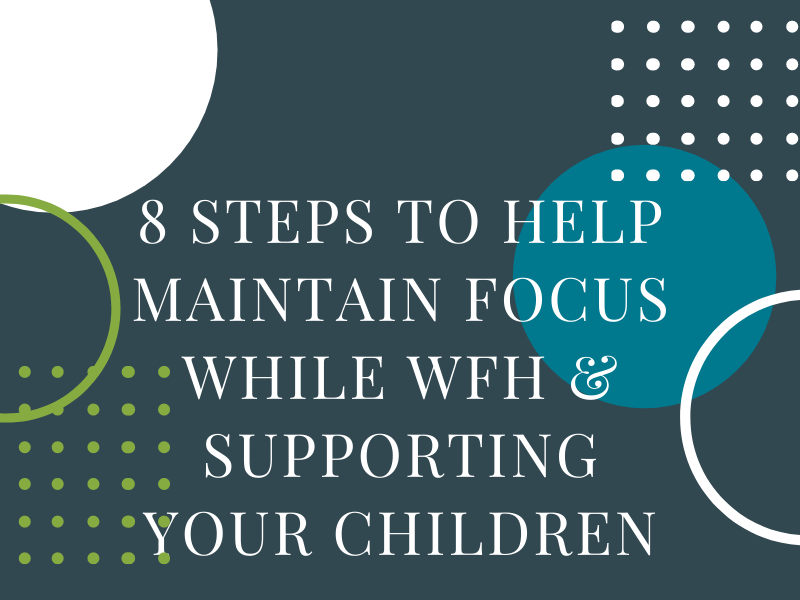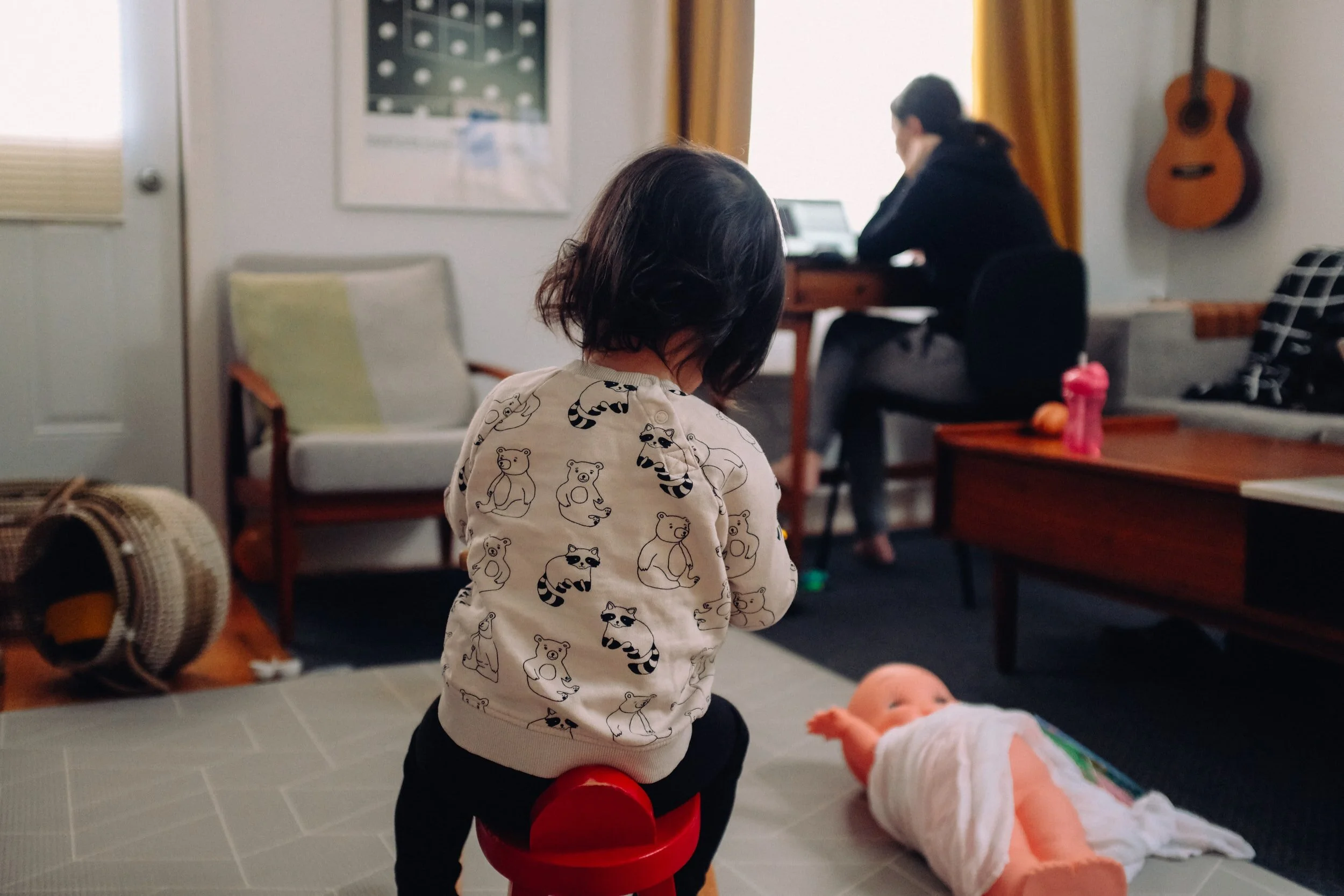8 steps to help maintain focus while working from home & supporting your children
Who would have thought that a year working from home while managing our own working schedules, balancing home life and the children would have taught us so much. I know for sure, I will never be a teacher, after two rounds of home-schooling! Joking aside, looking back now, it has been an incredibly intense, overwhelming and stressful period in our lives.
In March 2020, most of us were told to work and live our lives at home. While many parents and caregivers continued to work on site and still do, limitations were put on us like never before. There was a scramble for the quiet workspace at home as well as attempting to juggle work deadlines and targets. Along with making sure the kids were happy, home-schooled, while supporting our families when both children and adults alike were emotional, being impacted by isolation, loneliness, guilt, anxiety, exhaustion while many grieved – who would have imagined this was going to be our lives for over a year. When I put out a poll in May 2021 to my Parent Support community on Instagram, asking whether there is a parent or caregiver that goes out to work as opposed to working from home the large majority have transitioned back to the workplace with 68% working on site and 32% are working from home.
We are now seeing the ‘light’, slowly but surely the vaccine rollout is happening, society is opening back up, there is hope. This past year has shown parents, caregivers and children their strength, resilience, ability to cope with change, perseverance and dedication, regardless, whether that parent or caregiver has been the one working or the one keeping the show on the road in day-to day-life, we have all been impacted in some way, shape or form. When I asked what parents were finding helpful working from home an overwhelming number reported that not having a commute to work has made such a difference, because it means having more time to get things done, being productive and being with the kids too, not rushing out the door in utter chaos, getting a wash on or dinner prepared during breaks, the parent that would of been travelling or working a lot is getting to spend way more time with the kids, getting food shop delivered and again so many more positives!
I have supported working parents for over 7 years with the challenges they face when trying to juggle work and family life. The additional complexities of last year have created unprecedented pressure for parents and caregivers so here are few of my top tips for helping you to maintain focus while working from home and to support your children.
Common Challenges with Working from Home & Managing Family Life
When I asked what continues to be a challenge working from home and managing family life, many parents said that it’s a challenge ‘switching off from work’, the blur between family and working life and no real ‘breaks’ from each other. Additionally Covid scares in creche and school causing logistical challenges, being ‘available’ all of the time, keeping the kids out of a partner’s way when on a call, the parental guilt, missing the social aspect of work, missing colleagues and adult company. It’s important to acknowledge the employers’ expectations too, if working parents are feeling all of the above and more, the obvious consideration is ‘will that parent or caregiver manage ok?’ While a lot of employers have shown compassion in offering support and resources for their working parents, there are still many that don’t which adds to the daily pressures for the working parent to figure it out on their own.
How to Balance Work & Home Life in 8 Steps
Every family, work and home situation are different from the next, every household has their own needs and priorities, they hold different values to what is important to them, whether it is a single parent keeping it all going on their own or several adults. It’s also important to consider that the children are at all various ages, stages with different needs, personalities and temperaments – so no one family is the same!
As we see the final school term play out, a large majority of parents and caregivers continue to work from home, the school summer holidays are approaching and some families are in a similar situation to last year. What has created a stir of excitement and a sigh of relief for parents and children is sports and training opening back up, also, summer camps of all kinds are now taking bookings, from dance, adventure camps to water sports, arts and crafts to trampoline and inflatable camps! For the older children, it’s the opportunity to get back into part time work if they are old enough. All of these aspects will have a significant impact on form and general wellbeing.
Step 1: Adjust your mindset
You can’t be everything to everybody all the time, the parent, the childminder, the employee or the manager. While you can be strategic in your time management, it’s also important that you continue and allow yourself to be flexible in your work commitments along with your personal life.
Step 2: Manage your expectations
While many parents or caregivers have found a way that works for them it’s still important that you adjust your expectations to the reality of where you are at right now, that might mean matching your goals to your circumstances, something that has been key for many families in maintaining some form of calm and a reasonable level of productivity. Knowing and acknowledging that they are changing day by day and week by week.
You will have good days and others that will have you under more pressure so be realistic to what you can and can’t get done during these days, weeks and months ahead, when the kids are distracted and active versus when they need you most and are looking for your attention.
Know that right now is not forever and while there might be days where you feel like it’s not getting easier - the challenges will shift depending on your deadlines and work commitments and the kids' needs and the form they are in on a given day.
Step 3 : Communicate Daily
Communication plays a big part of family and working relationships regardless of where you are at right now, however its significance is just as important if not more important when one or both parents are working from home.
It can be simply going through our daily schedules, marking time in for calls, meetings, self-care – whether that be down time or getting out for some fresh air and who’s responsible for what during the day regarding work and caring for the children. Practicing this communication with the adults and the kids will continue to make daily life at home that little bit easier.
A lot of my clients do share how they find when the kids know the plan, they cope a lot better with change – whether that be who is picking them up from school, or when mum or dad are minding them while the other works or simply instilling routines – it automatically creates that consistency and predictability for them and the adult. I have often suggested providing a personalised calendar for the kids so they can refer to their own schedules - parent to edit accordingly, also a white board in the kitchen where reminders, menus, personal notes, appointments can be put up for all to see.
Step 4: Set boundaries & prioritize
Recognise and acknowledge when you have your work hat on versus being present as mum or dad. I’m very aware that it is not always as simple as that but – when you can.
Every working day will vary depending on what needs to be achieved. Identify your boundaries between work and family life by scheduling your hours that are most productive – is it a full block morning or afternoon, is it dipping in and out depending on each other’s schedules or is it saving the work that requires 100% attention for the evenings or weekends? This will be different for every family, as circumstance, expectations and situations vary so much.
Check out my blog on keeping your children entertained while at home.
Step 5: Managing guilt
It hasn’t taken a year of living with Covid-19 for parental guilt to knock on our door! From using screens and gaming devices to keep the kids occupied, to stocking up on endless supplies of snacks, maybe there were days when you haven’t been present for your kids like you want, to being a working parent juggling it all; feelings of parental guilt, has affected many people.
An exercise that may help you is to write a list of everything that is concerning you right now about being a working parent, the challenges and frustrations. Then apply the following steps to what you have noted:
Accept what you can’t change
If you must work to pay the bills then you can’t change that. Many children are now at home in the afternoons during school term or once the school holidays arrive it’s managing that too, you may not be able to change these realities, however it is important to look at what you can do.
Take ownership
Start to look at what you can take control of; what can you delegate, defer or influence? Go through your list and ask yourself - can I influence this or not, if I can – how can I?
For example:
I can’t control that we are in this situation where we are all at home working but what I can control is managing my own expectations, boundaries, how I communicate, the time I spend with the kids, managing my time as productively as possible and accepting that we all go through feeling guilty.
To learn more about creating boundaries checkout The Positive Parenting E-Learning Course
Step 6: Reduce the feelings of guilt
Identify the triggers - try and tune in to when guilt starts to spill over – plan about what you find works to alleviate it, talk to your partner, friend, close family member, meditate or make a list.
Focus on what is working for you and your family – focus on the positives, it is often during these more emotional times that the adults or the children feel overwhelmed and can doubt their own ability. Identify what your strengths are, what’s important to you and what might be helpful when you do feel overwhelmed. This kind of approach allows you to focus on the positives while also reinforcing your self-confidence.
Be honest with yourself and ask – what has helped you before, what is not a priority.
Be gentle on yourself as you continue to do the best you can, allow yourself to feel the emotions but don’t allow it take over.
Make 1:1 & Family Time - While you might be thinking – how much more time can I really spend with the kids? What I mean is outside of work creating dedicated and guaranteed time. Our children love being around us so often looking at doing something together as a family can be a big deal.
Step 7: Supporting Behaviours
For many families Covid-19 has had a significant impact on their mental health, relationships, behaviours and feelings of guilt and burn out trying to do it all. I talk a lot about understanding our children’s behaviours in my live webinars which can provide reassurance and alleviate guilt knowing how to deal with certain behaviours or situations.
Check my blog on Supporting your Children’s Behaviours
Step 8: Ask for Help & Support
This time has been like no other, while it has certainly been a year to remember and challenged us in such ways we never thought we would manage or get through – we are doing so with resilience and strength. Allow yourself to acknowledge and feel the tough times. Like I have said to so many families, ask for help if you need it, seek support and keep communication open at home with your partner, the children and your team. Allow yourself time out in whatever way helps you. We continue to see this to the end – it’s now just a matter of time.
If you are feeling overwhelmed or facing challenges with your children, I am here to help, I offer tailored 1 to 1 parent support sessions and Corporate Parenting Talks. Get in touch with me today at aoife@parentsupport.ie or if you are interested in creating a happier and calmer home, I offer a Positive Parenting eLearning Course.


